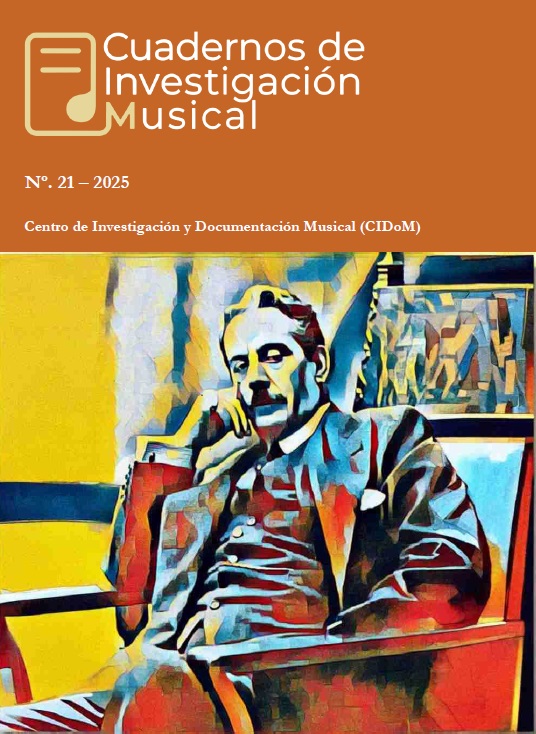Giacomo Puccini Expanded: Intermedia displacements of a teased lyricism
DOI:
https://doi.org/10.18239/invesmusic.2025.21.04Keywords:
Puccini, Modernism, Postmodernism, Parody, Contemporary operaAbstract
This study explores Giacomo Puccini's opera creation through its ongoing dialogue between modernism and postmodernism. While his operas never fully fit into the narrative of the former, in the latter they transcended the historiographical boundaries that initially defined them, becoming an object of constant reinterpretation. Based on the notion of displacement, I propose an analysis of the intertextual and intermedia impact of those traces that revitalised the Spanish music theatre at the height of its success, and that remain latent in experimental music and the most recent contemporary opera. This expanded and impure Puccini managed to escape his own lyricism by interweaving elements of rebellion, prompting the use of parody and its deconstruction to approach the most unexpected creative deviations of his legacy.
References
Abramović, M. (2023). 7 Deaths of Maria Callas. Marina Abramović. Londres: ENO, English National Opera, 3-11 de noviembre. https://www.eno.org/operas/7-deaths-of-maria-callas/.
Albert, G. (2011). La dimensione sonora nelle opere di Nam June Paik e Bill Viola (Tesis doctoral, Università di Pavia).
Baricco, A. (1999). El alma de Hegel y las vacas de Wisconsin. Madrid: Siruela.
Beltrán Núñez, P. (1997). Las parodias del género chico: La golfemia. Anales de la literatura española contemporánea, 22(3), pp. 379-404.
Beyst, S. (2005). John Cage's Europeras: A light- and soundscape as musical manifesto. https://web.archive.org/web/20101215030943/http://d-sites.net/english/cage.htm.
Caggiano, A. (2012). Living Room Music. John Cage – Il teatro musicale. John Cage: 4’33’’ Lezione sui funghi. Concerti, performance, teatro musicale, danza, arti visive, letture per il centenario di John Cage. Barga: Festival Opera Barga y Associazione Ars Ludi.
Clèment, C. (1979). L’Opéra, ou la défaite des femmes. París: Éditions Grasset.
Dickinson, P. (Ed.). (2006). CageTalk: Dialogues with and about John Cage. Rochester: University of Rochester Press.
Encabo Fernández, E. (2012). Una parodia de Wagner en España: De Lohengrin a Lorenzín. En J. I. Suárez García (Ed.), Ruperto Chapí. Nuevas perspectivas (pp. 209-221). Valencia: Institut Valencià de la Música.
Fetterman, W. (1996). John Cage's theatre pieces: Notations and performances. Nueva York: Routledge.
Galceran, A., Radigales, J., y Sesé, T. (2023). 7 Deaths of Maria Callas. Marina Abramović [programa de mano]. Barcelona: Gran Teatre del Liceu, 9-11 de marzo.
García-Tomás, R. (2019). Je suis narcissiste [programa de mano]. Madrid: Teatro Español, 7-10 de marzo, pp. 8-9.
Jameson, F. (2002). El giro cultural: Escritos seleccionados sobre el posmodernismo 1983-1998. Buenos Aires: Manantial.
Juett, J. C. (1994). Feminism in the work of Mary Daly, Toni Morrison, Pauline Oliveros, and Laurie Anderson (Tesis doctoral, University of Georgia).
McMurray, P. (2019). On Serendipity: Sonic Pleasures and Fleshy Archives of Sensual Ethnography. En G. F. Barz & W. Cheng (Eds.). Queering the field: Sounding Out Ethnomusicology (pp. 380-396). Nueva York: Oxford University Press.
Mockus, M. (2008). Sounding Out: Pauline Oliveros and Lesbian Musicality. Nueva York: Routledge.
Moral, I. R. (2020). Luigi Mancinelli, Giulio Ricordi y Francesco Tamagno, figuras fundamentales en la recepción del primer Puccini en España: El estreno de Edgar en el Teatro Real (1892). Cuadernos de Música Iberoamericana, 33, pp. 281-302.
Oliveros, P. (2005). Deep Listening. A Composer’s Sound Practice. Lincoln: iUniverse.
Oliveros, P., y Maus, F. (1994). A Conversation about Feminism and Music. Perspectives of New Music, 32(2), pp. 174-193.
Pazos, M. (2019). Je suis narcissiste [programa de mano]. Madrid: Teatro Español, 7-10 de marzo, pp. 10-11.
Pritchett, J. (1994). On John Cage's Europeras 3 & 4. Rose White Music. https://www.rosewhitemusic.com/cage/texts/europ3n4.html.
Scott, D. B. (2014). Musical Theatre(s). En H. M. Greenwald (Ed.). The Oxford handbook of opera (pp. 674-691). Nueva York: Oxford University Press.
Serrano Alonso, J. (1996). De Puccini a Salvador María Granés: Un juego paródico como recepción de la ópera italiana en España. En Paisaje, juego y multilinguismo: X Simposio de la Sociedad Española de Literatura General y Comparada (Vol. 2, pp. 257-268). Santiago de Compostela: Universidad de Santiago de Compostela.
Subirá, J. (1958). Puccini y el puccinismo en Madrid (Evocación conmemorativa de un centenario). Boletín de la Real Academia de Bellas Artes de San Fernando, 7, pp. 41-68.
Taylor, D. T. (1993). The Gendered Construction of the Musical Self: The Music of Pauline Oliveros. The Musical Quarterly, 77(3), pp. 385-396.
Von Gunden, H. (1983). The music of Pauline Oliveros. Metuchen: Scarecrow Press.
Weaver, S. (2017). Roots for Deep Listening in Oliveros’s Bye Bye Butterfly. American Music Review, 47(1), pp. 5-12.
Young, L. M. (1960). Composition 1960 #5. La Monte Young. Nueva York: MoMA, Museum of Modern Art. https://www.moma.org/collection/works/127627
Published
Issue
Section
License
Copyright (c) 2025 CARMEN NOHEDA TIRADO

This work is licensed under a Creative Commons Attribution-NonCommercial-NoDerivatives 4.0 International License.
Los autores de los artículos mantienen el copyright, no recibirán ninguna contraprestación económica por el trabajo y el mismo siempre será reconocido como exclusivamente suyo. La revista se compromete a proteger la integridad y originalidad del artículo, así como los derechos de autor que correspondan. Los autores son los únicos responsables del material, textos e imágenes que utilizan en sus respectivos trabajos, debiendo respetar siempre los derechos de autor de terceras personas, por lo que la revista no se hace responsable de lo contenido en este tema respecto al trabajo de los autores.


